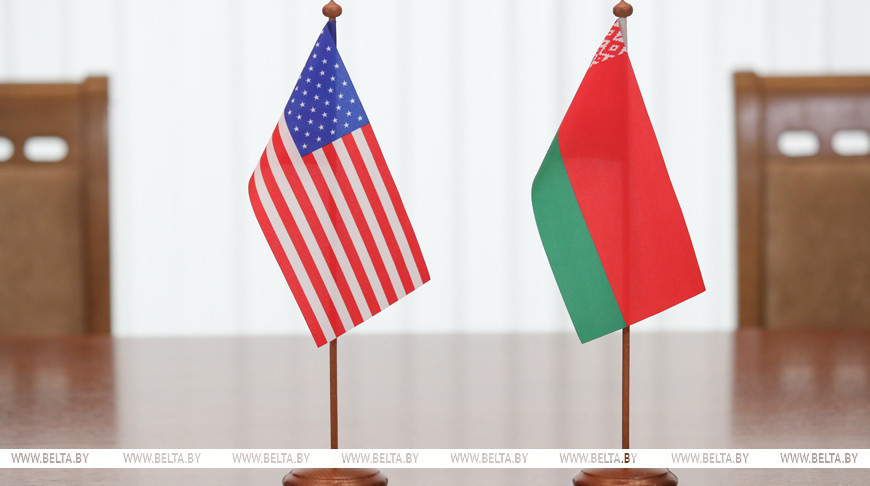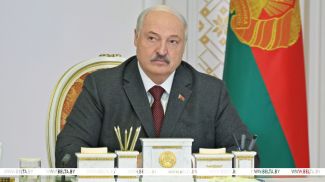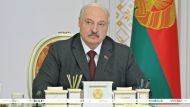
MINSK, 8 August (BelTA) – In an interview with TIME Magazine, Belarusian President Aleksandr Lukashenko unveiled the details of his talks with official representatives of the United States, BelTA reports.
Speaking about Belarus-U.S. relations, the head of state noted that bilateral ties had initially been good – even recalling a time when he played hockey on the same team as the U.S. ambassador. But later, especially during Russia’s special military operation, relations deteriorated significantly.
That said, ‘backchannel communications’ have been maintained. They operate mostly through intelligence services because they are beneath the threshold of public awareness. “I personally oversaw this process. Contacts were maintained through intelligence channels and I could bring in the Foreign Ministry if necessary, or government officials for specific matters, like sanctions. When discussing next steps or conceptual frameworks – particularly when formalizing a draft document – I engage the Foreign Ministry. However, primary communication still flows through intelligence channels. On your side, Christopher Smith was involved [Deputy Assistant Secretary at the U.S. Department of State]. A decent man – I always jokingly call him a CIA guy when he comes. We’ve met about five times already,” the head of state said.
According to the president, this person from the American side played a pivotal role in organizing visits of U.S. officials to Belarus – including the June visit of President Trump’s special envoy for Ukraine Keith Kellogg who met with Aleksandr Lukashenko. “This is already the fifth U.S. delegation. By the way, they initiated it. And credit where credit is due – Chris Smith played and still plays the key role here,” Aleksandr Lukashenko said. Naturally, President Donald Trump is aware of these developments, though Aleksandr Lukashenko doubts he’s deeply immersed in this matter.
The president noted that the U.S. side initiated the talks in Minsk and approached Belarusian diplomats based in New York with this proposal. “We receive signals from the Americans: they’d like to talk, discuss some regional and global issues. They’d like to talk about it. Well, we’re open to that,” Aleksandr Lukashenko said. He noted that while the Belarusian side was interested in such dialogue, it did not insist on making it public.
“What is America? Well, I don’t need to tell you what America is. It’s the world’s leader. Yes, it is weakened. Yes, sometimes you do strange things there for unclear reasons – the president says one thing in the morning, another in the evening and acts differently. We’ve seen it all there. But America remains America, and our relations are far from perfect. And the sanctions. What positive outcomes have they achieved? We are dependent on America – and not just us, but many other countries in today’s world, though the situation is changing. If they propose a dialogue, it’s good,” the president said.
Aleksandr Lukashenko stressed that the status of the U.S. negotiators was not a critical factor for him. “That’s my credo, my principle. You need to talk to everyone if you want normal relations. And if you don’t talk, you’re slowly moving toward war. We don’t need that. So there was this proposal, they came and maintained impeccable decorum throughout,” he explained.
Belarus consistently honored all agreements and maintained strict confidentiality. “The Americans asked us not to publicize it. And they didn’t come the way you did – by bus. They came as representatives of intelligence agencies. Fine, you want it that way? We’ll receive you that way. But we warned them: The Lithuanians will see you coming. – ‘Well, we’re on good terms with the Lithuanians...’ A few hours after they left, statements came from the Americans: ‘So-and-so has been released.’ Rubio [Marco Rubio, United States Secretary of State], I remember, made some statement. I think that maybe the American leaders needed to make those statements. I see Trump’s style: ‘Here’s what I did, here’s what I achieved’,” Aleksandr Lukashenko said.
The head of state emphasized that when Belarus began intensifying dialogue with the United States, it did not set out to achieve specific results, including getting the sanctions lifted, and generally does not have much faith in the United States’ serious commitment to normalizing relations. For example, Belarus still does not have a U.S. ambassador. However, naturally, if the sanctions were to be lifted, the Belarusian side would consider it a major step toward normalizing relations.
The journalist noted that the Trump administration expects officials to deliver concrete results that can be presented to voters as their own achievements. This was precisely how the release of certain prisoners was framed following the visit of U.S. officials to the country.
Aleksandr Lukashenko confirmed that these releases resulted from the agreements with U.S. representatives but emphasized that "our fugitives" had nothing to do with them. “They were not part of the negotiations regarding the release of these people. They have never raised the matter of their release. Well, except for Poznyak and, as they say, the old guard, the old opposition, who live in the West. They speak in favor of lifting the sanctions and [releasing] the political prisoners all the time. But these ones are charlatans. [Svetlana] Tikhanovskaya, [Pavel] Latushko and people like that are totally unrelated to the people that have been released. They were released due to our arrangements with Americans. It is clear. We’ve made it clear. And I’ve warned them: ‘If you say a word anywhere, I will be forced to publish all our positions.’ Americans honor it.”
In other words, Belarus considered the possibility of pardoning those prisoners whose release was requested by the Americans. And these are not political prisoners, but individuals convicted of serious crimes. Specifically, one had been sentenced to capital punishment (a German citizen), and his release became a stumbling block in prisoner exchange negotiations between Russia and Western countries. “I said: ‘Well, if it is so, if you cannot make an exchange with Russians due to this one man… I pardoned him and handed him over.’ In other words, there were concrete goals,” the head of state said.
At the same time, Aleksandr Lukashenko believes it is incorrect to focus attention on specific individuals among those who were pardoned. However, this is exactly what some media do by zeroing in on just one or two names. “You say ‘Tikhanovsky’. Listen, there were also 13 [other people who were pardoned that time]. And it makes no difference to me whether it is Tikhanovsky or the other people. As you say, I couldn’t care less,” the president said. “But it was my decision. He was not part of the deal. I said: ‘Well, listen, this Svetlana Tikhanovskaya has been crying and wants a family reunion. They have two kids. Okay, I will authorize the release of Tikhanovsky.’ It was my decision. But now I see that you are dissatisfied, the West is dissatisfied. And particularly the fugitives are dissatisfied.”













